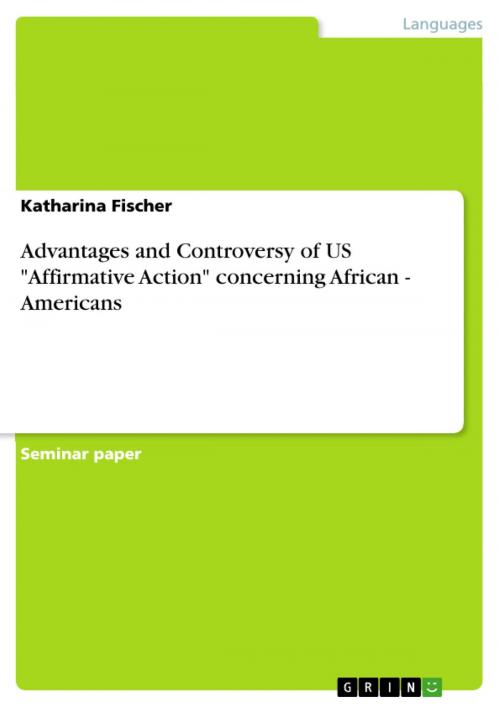Advantages and Controversy of US 'Affirmative Action' concerning African - Americans
Americans
Nonfiction, Reference & Language, Study Aids, ESL, Foreign Languages| Author: | Katharina Fischer | ISBN: | 9783640657490 |
| Publisher: | GRIN Publishing | Publication: | July 6, 2010 |
| Imprint: | GRIN Publishing | Language: | English |
| Author: | Katharina Fischer |
| ISBN: | 9783640657490 |
| Publisher: | GRIN Publishing |
| Publication: | July 6, 2010 |
| Imprint: | GRIN Publishing |
| Language: | English |
Seminar paper from the year 2010 in the subject English - Applied Geography, grade: 1,0, University of Kassel (FB 05 - Geschichte Großbritanniens und Nordamerikas), course: Hauptseminar: Immigration and Ethnicity in American History, language: English, abstract: In this term paper the author discusses US race relations under the aspect of 'affirmative action'. Under the influence of the civil rights movement African-Americans and white liberals managed to achieve a breakthrough in civil rights legislation in the 1960s. This became the foundation of administrative measures that were intended to get minorities into business, civil service and colleges. These are called 'affirmative action'. The policy, designed to achieve equal opportunities for blacks, is itself ambiguous as the law prohibits discrimination ad preferential treatment of any US citizen. The author focuses on this dilemma. First she defines what affirmative action is, what its purpose is and to what extend it can lead to preferential treatment. Then a look is taken at the history of African-Americans since the end of slavery in the 19th century. This is inevitable to understand the intentions and goals of the civil rights activism of the 1950s and 1960s. Chapter four focuses on the pros and cons of affirmative action. One the one hand the author explores philosophical, legal and social arguments for the advancement of blacks. On the other hand she analyses legal criticism of affirmative action and the argument of 'reverse discrimination'. Finally, the author explains why the US still needs affirmative action and how it can be revised.
Seminar paper from the year 2010 in the subject English - Applied Geography, grade: 1,0, University of Kassel (FB 05 - Geschichte Großbritanniens und Nordamerikas), course: Hauptseminar: Immigration and Ethnicity in American History, language: English, abstract: In this term paper the author discusses US race relations under the aspect of 'affirmative action'. Under the influence of the civil rights movement African-Americans and white liberals managed to achieve a breakthrough in civil rights legislation in the 1960s. This became the foundation of administrative measures that were intended to get minorities into business, civil service and colleges. These are called 'affirmative action'. The policy, designed to achieve equal opportunities for blacks, is itself ambiguous as the law prohibits discrimination ad preferential treatment of any US citizen. The author focuses on this dilemma. First she defines what affirmative action is, what its purpose is and to what extend it can lead to preferential treatment. Then a look is taken at the history of African-Americans since the end of slavery in the 19th century. This is inevitable to understand the intentions and goals of the civil rights activism of the 1950s and 1960s. Chapter four focuses on the pros and cons of affirmative action. One the one hand the author explores philosophical, legal and social arguments for the advancement of blacks. On the other hand she analyses legal criticism of affirmative action and the argument of 'reverse discrimination'. Finally, the author explains why the US still needs affirmative action and how it can be revised.















